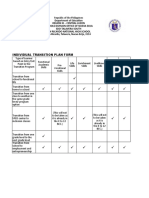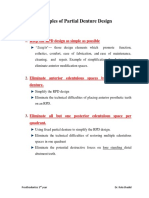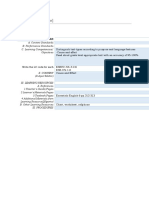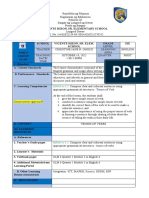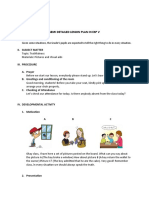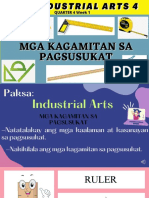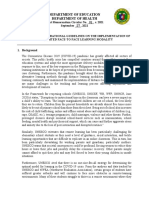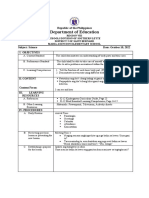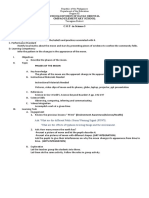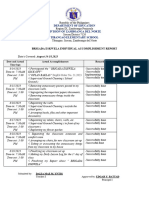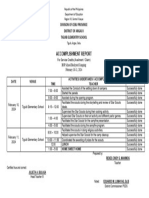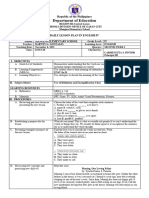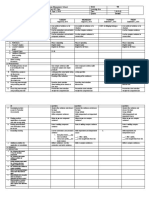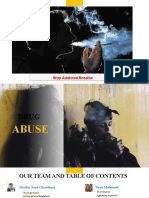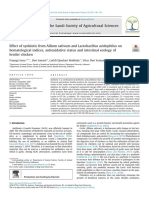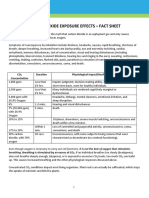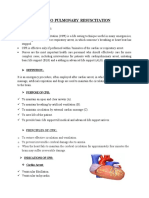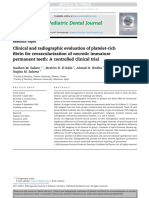0 ratings0% found this document useful (0 votes)
252 viewsBudget of Work - Health Grade 1-6
Budget of Work - Health Grade 1-6
Uploaded by
Conie FeThis document outlines a quarterly budget of work for a health education course for 1st grade students. Over the course of 4 quarters, students will learn about healthy eating habits, proper behavior during mealtimes, hand washing, personal hygiene, environmental health factors like clean water and indoor air quality, and when it is appropriate to ask for assistance from others. The budget details the most essential learning competencies, objectives, and timeline to be covered each week for maximizing students' health knowledge and skills.
Copyright:
© All Rights Reserved
Available Formats
Download as DOCX, PDF, TXT or read online from Scribd
Budget of Work - Health Grade 1-6
Budget of Work - Health Grade 1-6
Uploaded by
Conie Fe0 ratings0% found this document useful (0 votes)
252 views17 pagesThis document outlines a quarterly budget of work for a health education course for 1st grade students. Over the course of 4 quarters, students will learn about healthy eating habits, proper behavior during mealtimes, hand washing, personal hygiene, environmental health factors like clean water and indoor air quality, and when it is appropriate to ask for assistance from others. The budget details the most essential learning competencies, objectives, and timeline to be covered each week for maximizing students' health knowledge and skills.
Original Title
Budget of Work -Health Grade 1-6
Copyright
© © All Rights Reserved
Available Formats
DOCX, PDF, TXT or read online from Scribd
Share this document
Did you find this document useful?
Is this content inappropriate?
This document outlines a quarterly budget of work for a health education course for 1st grade students. Over the course of 4 quarters, students will learn about healthy eating habits, proper behavior during mealtimes, hand washing, personal hygiene, environmental health factors like clean water and indoor air quality, and when it is appropriate to ask for assistance from others. The budget details the most essential learning competencies, objectives, and timeline to be covered each week for maximizing students' health knowledge and skills.
Copyright:
© All Rights Reserved
Available Formats
Download as DOCX, PDF, TXT or read online from Scribd
Download as docx, pdf, or txt
0 ratings0% found this document useful (0 votes)
252 views17 pagesBudget of Work - Health Grade 1-6
Budget of Work - Health Grade 1-6
Uploaded by
Conie FeThis document outlines a quarterly budget of work for a health education course for 1st grade students. Over the course of 4 quarters, students will learn about healthy eating habits, proper behavior during mealtimes, hand washing, personal hygiene, environmental health factors like clean water and indoor air quality, and when it is appropriate to ask for assistance from others. The budget details the most essential learning competencies, objectives, and timeline to be covered each week for maximizing students' health knowledge and skills.
Copyright:
© All Rights Reserved
Available Formats
Download as DOCX, PDF, TXT or read online from Scribd
Download as docx, pdf, or txt
You are on page 1of 17
BUDGET OF WORK FOR THE MOST ESSENTIAL LEARNING COMPETENCIES
SUBJECT : HEALTH EDUCATION
GRADE :1
TIME ALLOTMENT : 40 MINUTES PER WEEK
MOST ESSENTIAL LEARNING
OBJECTIVES
QUARTER COMPETENCIES WEEK DAY
The learner…
I Distinguishes healthful from less 1 1 Distinguishes what food is
healthful foods healthful and less healthful.
Differentiates healthful and less
healthful foods.
2 1 Infers the consequences of
eating less healthful foods.
Tells the consequences of 3 1 Cites what foods are less
eating less healthful foods healthful.
Discusses the best situation that
affects to human body when
eating less healthful foods.
4 1 Understands the consequences
of eating less healthful foods.
*Practices good decision making 5 1 Explains the importance of
exhibited in eating habits that becoming healthy.
can help one become healthy Gives some examples of good
eating habits that can help one
becoming healthy.
6 1 Practices and maintain good
eating habits that can help one
to be healthy.
II Identifies proper behavior 1 1 Explains why proper behavior
during mealtime during mealtime should be
followed.
States some examples of proper
behavior during mealtime.
2 1 Identifies the manner of proper
behavior.
Demonstrates proper hand 3 1 Shows them how to wash hands
washing properly.
Demonstrates understanding
why washing hands properly is
important.
4 1 Practices the habit of washing
hands in a proper way.
Realizes the importance of 5 1 Shows them how to wash hands
washing hands properly.
Discusses why washing hands
BARCODE HERE
Document Control No:
DCC No. Here
properly is important.
Applies the habit of washing
hands in a proper way.
Practices habits of keeping the 6 1 Explains why we should keep our
body clean & healthy body clean and healthy.
Cites some good qualities of
having a clean and healthy body.
7 1 Applies and maintain the habits
of keeping a body clean and
healthy.
Realizes the importance of 8 1 Discusses some situations
practicing good health habits between having a good health
habits and bad health habits.
Shows some outcomes of a
person having a good health
habits.
Practices the good health habits.
III Describes the characteristics of 1 1 Discusses what a healthful home
a healthful home environment environment shows.
Shows some examples of having
a healthful home environment.
Formulates some ways how you
can maintain a healthful home
environment.
Discusses the effect of clean 2 1 Discusses the benefits of clean
water on one’s health water on one’s health.
Explains the result of having
clean water in a person.
Understands why clean water is
important to one’s health.
Discusses how to keep water at 3 1 Explains why we should keep
home clean water clean.
Shows them how to maintain the
water at home clean.
Advices them to keep the water
always clean.
Practices water conservation 3 1 Explains why we should practice
water conservation.
Demonstrates understanding on
the importance of water.
Explains the effect of indoor air 5 1 Discusses indoor air and its
on one’s health effects of a person’s health.
Gives an example of effects of
indoor air on one’s health.
6 1 Determines the environmental
conditions that is related in
indoor air.
Identifies sources of indoor air Understands the importance of
pollution keeping the home environment
healthful.
Practices ways to keep indoor Demonstrates healthful practices
air clean for a healthful home
environment.
Explains the effect of a home 7 1 Discusses the effects of indoor
environment to the health of air in one’s health.
the people living in it
Demonstrates how to keep the 8 1 Deliberates the ways on how to
home environment healthful keep your home clean and
healthful.
IV Identifies situations when it is 1 1 Demonstrates ways to ask for
appropriate to ask for help in a proper way.
assistance from strangers
Gives personal information, 2 1 Explains when and whom will
such as name and address to you give your personal
appropriate persons information if needed.
Identifies appropriate persons 3 1 Demonstrates ways to ask for
to ask for assistance help in a proper way.
Demonstrates ways to ask for Shows how to ask for help with
help manners in a person that can
help you with the current
situation.
Follows rules at home and in 4 1 Cites the house rules and school
school. rules properly.
Follows rules during fire and 5 1 Shows the possibilities during
other disaster drills fire with the help of disaster
drills.
Observes safety rules with stray 6 1 Demonstrates safety behaviors
or strange animals in daily activities to prevent
injuries.
Describes what may happen if 7 1 Cites the harmful moments
safety rules are not followed when rules are not followed.
Describes ways people can be 8 1 Explains and relate some
intentionally helpful or harmful possibilities and make sure to
to one another keep cautious in any situations.
Distinguishes between good 9 1 Relates some situations on how
and bad touch and when to touch to avoid
complications.
Practices ways to protect 10 1 Observes oneself and discuss
oneself against violent or how to avoid and prevent in this
unwanted behaviors of others situation.
BUDGET OF WORK FOR THE MOST ESSENTIAL LEARNING COMPETENCIES
SUBJECT : HEALTH EDUCATION
GRADE :2
TIME ALLOTMENT : 40 MINUTES PER WEEK
MOST ESSENTIAL
LEARNING
QUARTER WEEK DAY OBJECTIVES
COMPETENCIES
The learner…
I States that children Demonstrates good
have the right to decision making skills in
nutrition (right of the choosing food to eat to
1 1
child to nutrition article have a balanced diet.
24 of the un rights of
the child)
Discusses the Demonstrates
important function of understands on the
2 1
food and a balanced importance of eating a
meal balanced meal.
Names the foods that
3 1 belongs to healthy
balance meal
Considers food pyramid Demonstrates good
and food plate in decision making skills in
4 1
making food choices choosing food to eat to
have a balanced meal
Explains the food pyramid
5 1 and why we should follow
food pyramid in our diet.
Differentiate between
food pyramid and food
6 1
plate in making food
choices.
Displays good decision- Discuss the importance of
making skills in having good decision
7 1
choosing the right kinds decisions in choosing the
of food to eat right foods we eat.
Explain the necessary
8 1 skills in choosing the kind
of food to eat.
II Describes ways of Demonstrates
caring for the eyes, 1 understanding of the
1
ears, nose, hair and proper ways of taking care
skin in order to avoid of the sense organs.
common childhood Practices good health
health conditions 2 1 habits and hygiene for the
sense organs.
Cites some important
information on why we
3 1
should take good care of
our sense organs.
Shows some pictures
4 1 between a kid who’s not
taking good care of
his/her self and a picture
of a kid that follows the
practice of keeping
yourself hygienic.
Describes ways of Discuss the ways in caring
5 1
caring for the for the mouth and teeth.
mouth/teeth Demonstrates the proper
6 1 way of brushing teeth and
when to go to the dentist.
Displays self- Explains that taking care
management skills in of sense organs is
7 1
caring for the sense important.
organs
III Describes healthy Discusses the practices of
1 1
habits of the family healthy family habits.
Appraises the healthy
2 1
habits of the family.
Demonstrates good Identifies some examples
family health habits 3 1 of a family with good
and practices health habits.
Explains the ways and
4 1 practices of good family
health habits.
Explains the benefits of Explains expressing your
healthy expressions of feelings is a good way to
5
feelings 1 have a healthy person.
Cites the benefits of
expressing your feelings.
Expresses positive Explains the positive
feelings in appropriate expression of feelings
6 1
ways toward family members.
Demonstrates positive Explains the importance
ways of expressing of expression negative
7 1
negative feelings, such feelings to positive ways
as anger, fear, or toward family members.
disappointment Demonstrates
understanding on
8 1
expressing negative
feelings to positive ways.
Displays respect for the Applies expressing
feelings of others negative feeling to
positive ways with respect
to one another.
IV Discusses one’s right 1 1 Explains the safety rules
and responsibilities for and your responsibilities
safety as a person.
Identifies hazardous Discusses the consistency
areas at home in following safety rules to
2 1
avoid hazardous areas at
home.
Identifies hazardous Discuss the effect of
household products hazardous household
that are harmful if products that are harmful
ingested, or inhaled, if ingested, or inhaled,
3 1
and if touched and if touched especially
especially electrical electrical appliances.
appliances
Recognizes warning Discusses the importance
labels that identify of putting a labels that
harmful things and 4 1 identify harmful things
substances and substances.
Explains rules for the Explains the consistency
safe use of household in following safety rules at
chemicals 5 1 home and school.
Follows rules for home Explains why house rules
safety are very important.
6 1
Cites some house rules
why it should be followed.
Identifies safe and Knows what practices are
unsafe practices and safe and unsafe in school.
conditions in the school 7 1 Explains why we should
be cautious in our actions
in school.
Practices safety rules Demonstrates an
during school activities understanding of rules to
ensure safety at school
8 1
specially the participation
of physical activities.
BUDGET OF WORK FOR THE MOST ESSENTIAL LEARNING COMPETENCIES
SUBJECT : HEALTH EDUCATION
GRADE :3
TIME ALLOTMENT : 40 MINUTES PER WEEK
QUARTER MOST ESSENTIAL LEARNING WEEK DAY OBJECTIVES
COMPETENCIES
The learner…
I Describes a healthy person Identifies what a healthy person
1 1
looks like.
Explains why a person needs to
2 1
be healthy.
Explains the concept of Discusses condition that results
malnutrition from eating a food that causes
health problems such as
malnutrition.
Identifies nutritional Discusses the common
problems nutritional problems.
Explain why nutritional
3 1
problems exist when your diet
is not proper.
Describes the Cites the symptoms of
characteristics, signs and becoming a malnutrition.
symptoms, effect of the 4 1 Explains why the symptoms
various forms of occurs.
malnutrition
Discusses ways of preventing Discusses some good decision
the various forms of skills in making food choice.
malnutrition 5 1 Identifies some of the
preventions of malnutrition.
Discusses the different Demonstrates understanding of
nutritional guidelines the importance of nutritional
6 1
nutritional guidelines for guidelines and balanced diet in
Filipino good nutrition and health.
Shows some practices how to
7 1 keep healthy with healthful
foods.
Describes ways of Cites some practices to keep a
maintaining healthy lifestyle person healthy.
Evaluates one’s lifestyle 8 1 Shows some outcome of a
adopts habits for a healthier person’s health by maintaining
lifestyle a healthy lifestyle.
II Identifies common Identifies some common
childhood diseases childhood diseases.
1 1 Discusses and expand its idea of
having a disease during
childhood.
*Discusses the different risk Explains the effect of the
factors for diseases and different risk factors for
example of health condition 2 1 diseases and example of health
under each risk factor condition under each risk
factor.
Explains the effects of 3 1 Expands the idea of having
common diseases common diseases and its
effects.
Explains measures to Shows consistently practices of
prevent common diseases 4 1 healthy habits to prevent and
control diseases.
Cites some best ways to avoid
5 1
common diseases.
Explains the importance of Explains the importance of
proper hygiene and building proper hygiene in one’s health
6 1
up one's body resistance in to prevent diseases and
the prevention of diseases maintain a healthful life.
Demonstrates good self- Explains the good practices of
7 1
management and good- keeping healthy.
decision making-skills to Identifies ways on how to
prevent common diseases 8 1 prevent common diseases.
III Defines a consumer Explains what a consumer does
1 1
in the society.
Explain the components of Demonstrates understanding of
consumer health 2 1 the different components of
consumer’s health.
Discusses the different Explains the effect in the proper
factors that influence choice 3 1 choice of goods and services.
of goods and services
Discusses some ideas of being a
consumer and its different
4 1
factors that affect the choice of
goods and serves.
Describes the skills of a wise Explain critical thinking skills as
5 1
consumer a wise consumer.
Demonstrates consumer Shows example of what a
skills for given simple 6 1 consumer plays role in the
situations society.
7 Explains the basic consumer
1
rights.
Identifies basic consumer
Uses the bill as an example by
rights
8 1 identifying the basic consumer
rights.
Discusses consumer Explains why does consumer
9 1
responsibilities have responsibilities.
Identifies reliable sources of Explains when to believe some
health information health information.
10 1 Cites some sources on where to
find a reliable health
information.
IV Explains road safety Explains the understanding of
practices as a pedestrian 1 1 risks to ensure road safety and
in the community.
Gives best examples of
2 1
practices on the road.
Explains basic road safety 3 Discusses the basic road safety
1
practices as a passenger practices as a passenger.
Cites the importance of safety
4 1
practices on the road.
Demonstrates road safety Explains the importance of road
practices as a passenger safety practices as a passenger.
Explains the meaning of Knows the purpose of the
traffic signals and road signs traffic signals and road signs.
5 1 Explains its purpose and
importance on the road.
Describes dangerous, Discuss awareness on the
destructive, and disturbing dangerous, destructive, and
road situations that need to 6 1 disturbing road situations that
be reported to authorities need to be reported to
authorities
Displays self-management Demonstrates understanding of
skills for road safety. 7 1 risks to ensure road safety and
in the community.
Identifies hazards in the Identifies hazards in the
community 8 1 community to avoid
unnecessary physical problems.
Follows safety rules to avoid Explains why we should follow
9 1
accidents in the community road rules for our safety.
Recommends preventive Applies consistency in following
action for a safe community 10 1 safety rules to road safety and
in the community.
BUDGET OF WORK FOR THE MOST ESSENTIAL LEARNING COMPETENCIES
SUBJECT : HEALTH EDUCATION
GRADE :4
TIME ALLOTMENT : 40 MINUTES PER WEEK
MOST ESSENTIAL LEARNING
OBJECTIVES
QUARTER COMPETENCIES WEEK DAY
The learner…
I Explains the importance of Understands importance of
reading food labels in 1 1 reading food labels in selecting
selecting and purchasing healthier and safer food.
foods to eat Discusses why reading food
2 1
labels is necessary.
Analyzes the nutritional Knows the value and its
value of two or more food importance of reading food
products by comparing the 3 1 labels in selecting healthier and
information in their food safer food.
labels
Describes ways to keep food 4 1 Demonstrates on how to
clean and safe
prepare food clean and safe.
Discusses the importance of Discusses the ways on how to
5 1
keeping food clean and safe keep your food clean and safe.
to avoid disease Explains the importance of
6 1 keeping food clean and safe to
prevent disease.
Identifies common Practices appropriate daily
foodborne diseases 7 1 intake of food to prevent food-
borne disease.
Describes general signs and Identifies some signs of food-
symptoms of food-borne borne diseases.
diseases 8 1 Explains prevention of the
symptoms of food-borne
diseases.
II Describes communicable Demonstrates understanding
diseases 1 1 what communicable diseases
are.
Identifies the various disease Discusses the cause/s of a
2 1
agents of communicable communicable diseases.
diseases Cites what are the possible
3 1 prevention of a communicable
diseases.
Enumerates the different Discusses the different
elements in the chain of elements in the chain of
4
infection 1 infection.
Explains the 6 different links;
chain of infection.
Explains the possible prevention
5 1
for the chain of infection.
Describes how Discusses different kind of
communicable diseases can communicable diseases that
6 1
be transmitted from one can be easily transmitted to a
person to another. person to another.
Cites some ways in preventing
7 1
communicable diseases spread.
Demonstrates ways to stay Demonstrates understanding on
healthy and prevent and the importance of being
8 1
control common healthy.
communicable diseases
Identifies ways to break the Explains how to prevent and
chain of infection at avoid the infection.
respective
Practices personal habits and 9 1 Practices personal and
environmental sanitation to environmental measures to
prevent and control common prevent and control common
communicable diseases communicable diseases.
III Describes uses of medicines 1 1 Discusses the proper use of
medicines.
Cites some importance why we
need to know the uses of
medicines.
Differentiates prescription Demonstrates understanding on
from non-prescription 2 1 the appropriateness of taking
medicines prescribed medicines.
Describes the potential Discusses the proper use of
dangers associated with 3 1 medicines to prevent misuse
medicine misuse and abuse and harm to the body.
Explains the consequences of
4 1 self-medication and improper
use of the medicines.
Describes the proper use of Explains the proper use of
medicines 5 1 medicines by always reading
and checking the labels.
Discusses why we should follow
6 1 instructions and medical
prescriptions.
Explains the importance of Discusses the proper use of
reading drug information 7 1 medicines to prevent misuse
and labels, and other ways and harm to the body.
to ensure proper use of Discusses the importance of
medicines reading drug information and
7 1
labels, and other ways to
ensure proper use of medicines.
IV Recognizes disasters or Discusses the possible
emergency situations 1 1 avoidance of disasters or
emergency situations.
Demonstrates proper Discusses proper response
response before, during, and 2 1 before, during and after disaster
after a disaster or an or an emergency situations.
emergency situation Explains how to take actions in
3 1 a certain disaster and
emergency situation.
Relates disaster Demonstrates understanding
preparedness and proper why we should learn the safety
response during emergency 4 1 guidelines during disasters,
situations in preserving lives emergency and other high-risk
situations.
Describes appropriate safety Demonstrates understanding of
measures during special 5 1 the safety measures during
events or situations that may special events.
put people at risk Explains the possible outcomes
by not following the safety
6 1
guidelines or policies in a
certain event.
Describes the dangers of Discusses the consequences of
engaging in risky behaviors engaging dangerous behaviors.
7 1
such as use of firecrackers,
guns, alcohol drinking
Advocates the use of 8 Recommends some alternative
alternatives to firecrackers ways how to celebrate special
1
and alcohol in celebrating events by not using firecrackers
special events and avoiding alcohol drinking.
BUDGET OF WORK FOR THE MOST ESSENTIAL LEARNING COMPETENCIES
SUBJECT : HEALTH EDUCATION
GRADE :5
TIME ALLOTMENT : 40 MINUTES PER WEEK
MOST ESSENTIAL LEARNING
OBJECTIVES
QUARTER COMPETENCIES WEEK DAY
The learner…
I Describes a mentally, Discusses the definitions of mental,
emotionally and socially 1 1 emotional and social health concerns.
healthy person Discusses the characteristics of a healthy
2 1 person (mentally, emotionally and
socially).
Suggests ways to develop and Discusses the ways to develop and
maintain one’s mental and 3 1 maintain one’s mental and emotional
emotional health health.
Recognizes signs of healthy Distinguished the outcomes of having
4 1
and unhealthy relationships health and unhealthy relationships.
Explains how healthy Shows how healthy relationships can
relationships can positively 5 1 positively affects your health.
impact health
Discusses ways of managing Expands the understanding of unhealthy
unhealthy relationships relationships.
6 1
Cites some ways on how to manage and
fix unhealthy relationships.
Discusses the effects of Explains why we should control and take
mental, emotional and social good care not just in our physical health
health concerns on one’s 7 1 but also mental, emotional and social
health and well-being health and how it affects to our well-
being.
Demonstrates skills in Discusses some ways how to prevent,
preventing or managing avoid and manage negativity on the
8 1
teasing, bullying, harassment surroundings.
or abuse
Identifies appropriate 9 1 Determines when and where to seek help
resources and people who can about health concerns.
help in dealing with mental,
emotional and social, health
concerns
II Recognizes the changes Explains the existence and awareness of
during puberty as a normal puberty.
part of growth and 1 1 Relates some experiences from physical
development - physical changes. Emotional change, social
change - emotional change - change.
social change Tells why these changes appear and
2 1 explain why it is normal part of growth
and development.
Assesses common Explains common misconceptions about
misconceptions related to puberty.
3 1
puberty in terms of scientific Tells how these affect in our physical
basis and probable effects on body.
health Cites and discuss the scientific basis about
4 1
puberty.
Describes the common health Cites the health issues that happen during
issues and concerns during puberty.
puberty 5 1 Tells how it affects to the people when
common health issues occur during
puberty.
Accepts that most of these Explains why abnormal conditions
concerns are normal happen during puberty and why it is
6 1
consequence of bodily normal.
changes
Discusses the negative health Explains the consequences of dealing
impact and ways of 7 1 with unplanned and unwanted
preventing major issues such pregnancy.
as early and unwanted Cites the effects of early and unwanted
8 1
pregnancy pregnancy.
Demonstrates ways to Shows how to properly take good care of
manage puberty-related your healthy and body during puberty
health issues and concerns stage.
Practices proper self-care Employs self-management for personal
procedures health.
Demonstrates the proper self-care and
9 1 management procedures.
Discusses the importance of Explains why it is important to at least
seeking the advice of seek some advice from medical experts
professionals/ trusted and about health issues and concerns during
reliable adults in managing puberty stage.
puberty-related health issues
and concerns
Differentiates sex from gender 10 1 Explains the difference between “male,
female or bisexual”.
Identifies factors that Cites the factors which influence gender
influence gender identity and identity and gender roles.
gender roles
Discusses how family, media, Clarifies general reinforce gender roles in
religion, school and society in every situation.
general reinforce gender
roles
Gives examples of how male Shows examples how gender roles are
and female gender roles are changing and why and how these happen.
changing
III Explains the concept of 1 Understands the nature and effects of
1
gateway drugs drugs.
Identifies products with 2 Gives example of some products that
1
caffeine contains caffeine.
Describes the general effects Understands the effects of use and abuse
of the use and abuse of 3 1 of caffeine, tobacco and alcohol.
caffeine, tobacco and alcohol
Shows how these affects to your health
4 1 and the consequences of abusing yourself
through caffeine, tobacco and alcohol.
Analyzes how the use and Explains the risks of using and abusing
abuse of caffeine, tobacco and 5 1 oneself through caffeine, tobacco and
alcohol can negatively impact alcohol.
the health of the individual, Cites some of using caffeine, tobacco and
the family and the community 6 1 alcohol and how it affects to the family
and the community.
Demonstrates life skills in Shows how healthy a person is without
keeping healthy through the 7 1 attempting and using drugs.
non-use of gateway drugs
Follows school policies and Gives importance to the school policies
national laws related to the and national laws about using and selling
sale and use of tobacco and tobacco and alcohol.
8 1
alcohol Cites why we should follow the school
policies and national laws related to
tobacco and alcohol.
Demonstrates the ability to protect one’s
9 1
healthy by following the policies.
IV Explains the nature and Demonstrates understanding of the
1 1
objectives of first aid nature and objectives of basic first aid.
Discusses basic first aid Explains the importance of basic first aid
2 1
principles principles.
Demonstrates appropriate Discusses the risk by not applying basic
first aid for common injuries 3 1 first aid for common injuries or
or conditions conditions.
Identifies some effects of injuries or
4 1 conditions without the application of
appropriate first aid.
Demonstrates the proper application of
5 1 first aid for common injuries or
conditions.
Practices appropriate first aid principles
6 1
and procedure for common injuries.
7 1 Assesses on the application of the
appropriate first aid for common injuries
and conditions.
Evaluate the proper application of first
8 1
aid for common injuries or conditions.
BUDGET OF WORK FOR THE MOST ESSENTIAL LEARNING COMPETENCIES
SUBJECT : HEALTH EDUCATION
GRADE :6
TIME ALLOTMENT : 40 MINUTES PER WEEK
MOST ESSENTIAL LEARNING
QUARTE OBJECTIVES
COMPETENCIES WEEK DAY
R
The learner…
I Describes personal health Demonstrates understanding of personal
1 1
issues and concerns health issues and concerns.
Examines the idea of knowing your
2 1
personal health issues and concerns.
Understands why we need to be
3 1 knowledgeable about personal health
issues and concerns.
Demonstrates self- Practices self-management skills to
management skills 4 1 prevent and control personal health issues
and concerns.
Explains the importance of Discusses the importance of health
undergoing health appraisal appraisal procedures and community
procedures 5 1 resources in preventing or managing them.
Regularly undergoes health Explains why we should undergo health
appraisal procedure appraisal procedure regularly.
Identifies community health Demonstrates understanding of personal
resources and facilities that health issues and concerns and the
may be utilized to address a 6 1 importance of health appraisal procedures
variety of personal health and community resources in preventing or
issues and concerns managing them.
Discusses the importance of health
7 1 appraisal procedures and community
resources in preventing or managing them.
Understands when to address about your
8 1
personal health issues and concerns.
II Describes healthy school and Identifies the characteristics of a healthy
1 1
community environments school and community environment.
Explains the effect of living in Describes the surroundings of having a
2 1
a healthful school and healthy school and healthy community.
community Understands the importance of keeping
3 1 the school and community environments
healthy.
Demonstrates ways to build Understands why we should practice
and keep school and 4 1 building and maintaining healthy school
community environments and community environment.
healthy 5 1 Cites some ways on how to keep a school
and community environment healthy.
Practices proper waste Demonstrates understanding on the
management at home, in practice of the idea of proper separation of
6 1
school, and in the waste.
community
Advocates environmental Discusses why we should implement the
protection through proper practice of separation of waste.
7 1
waste management Cite the effects of proper waste
management.
Knows why we are safe when we follow
8 1
the separation if waste management.
III Explains how poor Knows the health implications of poor
environmental sanitation can environmental sanitation.
1 1
negatively impact the health
of an individual
Discusses ways to keep water Explains the proper way on how to
and air clean and safe 2 1 practice keeping water and air clean and
safe.
Explains the effect of a noisy Tells the effects of noisy environment.
environment 3 1 Knows why we should control noise
pollution
Suggests ways to Practices ways on how to control/manage
control/manage noise noise pollution.
4 1
pollution Understands the value of maintaining a
peaceful environment.
Knows the effect of uncontrolled noise
5 1
pollution.
Practices ways to Discusses why we should control/manage
control/manage noise noise pollution.
6 1
pollution Exhibits some ways on how to control the
noise pollution.
Explains the effect of pests Knows the role of pests and rodents to
and rodents to one’s health one’s health.
7 1
Discusses the effects of pests and rodents
to one’s health.
Practice ways to prevent and Tells the ways on how to control and
control pests and rodents 8 1 prevent pests and rodents.
IV Explains the importance of Discusses the importance of consumer’s
1 1
consumer health health.
Explains the different Knows the 3 components of consumer’s
components of consumer 2 1 health (health information, health
health products, health services).
Differentiates over- the- Discusses the types and uses of medicines.
counter from prescription Explains the difference between over-the-
3 1
medicines counter medicines and prescription
medicines.
Gives example of over the Identifies examples of medicine that can
counter and prescription 4 1 be bought over-the-counter and
medicines prescription medicines.
Explains the uses of some Shows the proper use of over the counter
over the counter and 5 1 medicines and prescription medicines to
prescription medicines prevent misuse and harm to the body.
Identifies the common Demonstrates critical thinking skills in the
propaganda techniques used 6 1 selection of health products.
in advertising
Analyzes packaging and Explains the proper use of medicines by
7 1
labels of health products always reading and checking the labels.
Practices good decision Demonstrates critical thinking skills in the
making skills in the selection 8 1 selection of health products.
of health products
Discusses ways to protect Explains the consequences of taking
9 1
oneself from fraudulent fraudulent health products.
health products Cited some ways on how to prevent from
10 1
fraudulent health products.
References:
1. Most Essential Learning Competencies (MELC 2020)
2. DepEd Order No. 21, s. 2019
3. K to 12 Basic Education Curriculum
You might also like
- Individual Transition Plan FormDocument16 pagesIndividual Transition Plan FormAngelo MarquezNo ratings yet
- Spina BifidaDocument27 pagesSpina BifidaSandy VillarNo ratings yet
- The Excitement of Science - John PlattDocument6 pagesThe Excitement of Science - John Plattramanujan109026No ratings yet
- 04.01.20 GOV Statewide Stay at Home OrderDocument2 pages04.01.20 GOV Statewide Stay at Home OrderGovernor Tom Wolf100% (1)
- Principles of Partial Denture DesignDocument29 pagesPrinciples of Partial Denture Designkanikak97No ratings yet
- 7e's Lesson PlanDocument6 pages7e's Lesson PlanRene ChuaNo ratings yet
- Sept 2-6 2024-Week6Document6 pagesSept 2-6 2024-Week6francy100% (1)
- Lesson PlanDocument5 pagesLesson PlanMichell Betio100% (1)
- (Enter Post Title Here) : I. ObjectivesDocument4 pages(Enter Post Title Here) : I. Objectiveslovely venia m joven100% (1)
- Lesson Plan Science 5Document9 pagesLesson Plan Science 5Marj Reña LunaNo ratings yet
- COT1 - Verb Tenses - OngcoDocument7 pagesCOT1 - Verb Tenses - OngcoJane ChristineNo ratings yet
- FILIPINO 1 - Quarter 3 - Week 8 (COT)Document9 pagesFILIPINO 1 - Quarter 3 - Week 8 (COT)Actions Avon100% (1)
- Week 7 Catch Up Friday Grade 4Document12 pagesWeek 7 Catch Up Friday Grade 4Liza ACNo ratings yet
- Antagan 2Nd Elementary School: (S6MT-ll-f-3)Document3 pagesAntagan 2Nd Elementary School: (S6MT-ll-f-3)Ethelinda Gambol100% (1)
- LP Sci 6-Wheel & AxleDocument2 pagesLP Sci 6-Wheel & AxleLV BENDANA100% (1)
- SBFP-Form-5 - PAPAACDocument2 pagesSBFP-Form-5 - PAPAACRenabeth CastroNo ratings yet
- Script GSPDocument5 pagesScript GSPCECILIA PORDONZALANNo ratings yet
- Lesson Plan in Esp Grade 5Document4 pagesLesson Plan in Esp Grade 5Nancy Saavedra100% (1)
- DLL - Science 6 - Q2 - W1Document10 pagesDLL - Science 6 - Q2 - W1Erika ShoppeeNo ratings yet
- ENGLISH Lesson Exemplar WEEK7Document5 pagesENGLISH Lesson Exemplar WEEK7Iza Mae AlunanNo ratings yet
- Deped Order 12 S 2015Document1 pageDeped Order 12 S 2015Scepter100% (2)
- Lesson Plan in PE & HEALTH.Document10 pagesLesson Plan in PE & HEALTH.lorena marinasNo ratings yet
- DLL SCIENCE WEEK 10-Fadfwedfwdqgehgda42346532536555seDocument12 pagesDLL SCIENCE WEEK 10-Fadfwedfwdqgehgda42346532536555seDee ZaidNo ratings yet
- Week 34 DLLDocument6 pagesWeek 34 DLLMae T OlivaNo ratings yet
- Grade 5 DLL SCIENCE 5 Q3 Week 4Document4 pagesGrade 5 DLL SCIENCE 5 Q3 Week 4Christine Segovia Isaac100% (1)
- Department of Education: Simplified Melc-Based Weekly Budget of Lessons in Mtb-Mle 2Document6 pagesDepartment of Education: Simplified Melc-Based Weekly Budget of Lessons in Mtb-Mle 2Cherryl Virtudazo DaguploNo ratings yet
- DLP in Science 6 - Separating Mixture-Cot Q1Document4 pagesDLP in Science 6 - Separating Mixture-Cot Q1Evangeline Del RosarioNo ratings yet
- Curriculum Map For Science 4-John: Quarter/ WeekDocument2 pagesCurriculum Map For Science 4-John: Quarter/ WeekChrislyn Gabucan-GomonitNo ratings yet
- Epp4 May 2 Kagamitan Sa PagsusukatDocument27 pagesEpp4 May 2 Kagamitan Sa PagsusukatGlaidel Marie PiolNo ratings yet
- Daily Lesson LOG School: Matindeg Elementary School Grade Level: FOUR Teacher: WARREN M. SINCO English Teaching Dates/Time: Week 3 Quarter: 2NDDocument5 pagesDaily Lesson LOG School: Matindeg Elementary School Grade Level: FOUR Teacher: WARREN M. SINCO English Teaching Dates/Time: Week 3 Quarter: 2NDWarren Millo SincoNo ratings yet
- DEPED DOH JMC No. 01 S. 2021Document27 pagesDEPED DOH JMC No. 01 S. 2021Jaymar MagtibayNo ratings yet
- Cot Lesson Plan Week 7 Q1Document6 pagesCot Lesson Plan Week 7 Q1Rothessa LumiguidNo ratings yet
- The Impacts of Happy School Movement (Research)Document3 pagesThe Impacts of Happy School Movement (Research)Jonald Domingo MacasioNo ratings yet
- SF 9 - 4-6 (Learner's Progress Report Card) TCRAFTDocument2 pagesSF 9 - 4-6 (Learner's Progress Report Card) TCRAFTRoniel Branzuela100% (1)
- GRADES 1 To 12 Daily Lesson Log Monday Tuesday Wednesday Thursday FridayDocument6 pagesGRADES 1 To 12 Daily Lesson Log Monday Tuesday Wednesday Thursday FridayTeresa Medina TicsayNo ratings yet
- Cot-Filipino - PangngalanDocument4 pagesCot-Filipino - PangngalanEdz Abrea Gabona100% (1)
- Respect Lesson PlanDocument2 pagesRespect Lesson Planapi-385531285No ratings yet
- Grade 4 DLL Quarter 2 Week 7 (Sir Bien Cruz)Document27 pagesGrade 4 DLL Quarter 2 Week 7 (Sir Bien Cruz)FUMIKO SOPHIANo ratings yet
- Cot DLP Grade4Document15 pagesCot DLP Grade4SARAH D VENTURANo ratings yet
- COT 4th Quarter Sources of WaterDocument4 pagesCOT 4th Quarter Sources of WaterNerissa Baricaua100% (1)
- Homeroom Guidance: Quarter 4 - Module 13Document8 pagesHomeroom Guidance: Quarter 4 - Module 13leaNo ratings yet
- Identifying Whether The Materials Are Useful and Harmful.: Performance Tasks in Science 5 First QuarterDocument7 pagesIdentifying Whether The Materials Are Useful and Harmful.: Performance Tasks in Science 5 First QuarterJigs Michelle Pasamonte50% (2)
- Cot - DLP - Science 5 by MaloiDocument7 pagesCot - DLP - Science 5 by MaloiMaria Kristina AtuganNo ratings yet
- Science 4 Q2 Week3 Lesson2Document7 pagesScience 4 Q2 Week3 Lesson2JM C VittoNo ratings yet
- Visualizing Congruent PolygonsDocument20 pagesVisualizing Congruent PolygonsShielo Restificar100% (1)
- Quarter 4 Week 9 EnglishDocument54 pagesQuarter 4 Week 9 EnglishJanine Jordan Canlas-BacaniNo ratings yet
- Accomplishment BrigadaDocument1 pageAccomplishment BrigadaShann Lia100% (1)
- DLP Science 4 - Q4 Wk.3.2Document3 pagesDLP Science 4 - Q4 Wk.3.2VEN JUNE SADANA100% (1)
- COT 1 April 27, 2021: ENG6G-Ig-4.4.1Document20 pagesCOT 1 April 27, 2021: ENG6G-Ig-4.4.1Warren Millo SincoNo ratings yet
- Lesson Plan in Science - EcosystemDocument10 pagesLesson Plan in Science - Ecosystemchristinejem.geligNo ratings yet
- Grade4 Eng Reading Catch Up FridayDocument3 pagesGrade4 Eng Reading Catch Up FridaySheila M. LaragaNo ratings yet
- ENG6VC-IIIA-6.2: English 6 Enhanced Las Activity Sheets Week 1Document5 pagesENG6VC-IIIA-6.2: English 6 Enhanced Las Activity Sheets Week 1Greyzz C100% (1)
- Grade 2.liquids Good For YouDocument1 pageGrade 2.liquids Good For YouLucy CataquisNo ratings yet
- GSP ACCOMPLISHMENT REPORT For Service Credits RequiremntsDocument1 pageGSP ACCOMPLISHMENT REPORT For Service Credits RequiremntsRenes Cindy GelberoNo ratings yet
- Detailed LP The Bunny's Magical PresentDocument4 pagesDetailed LP The Bunny's Magical PresentAlmira Suitos Pascua DeguzmanNo ratings yet
- Grade 4 DLL ENGLISH 4 Q3 Week 3Document5 pagesGrade 4 DLL ENGLISH 4 Q3 Week 3Sheena Claire dela PeñaNo ratings yet
- KINDERGARTEN-dll-new Week5Document10 pagesKINDERGARTEN-dll-new Week5Jacqueline Joie AnuranNo ratings yet
- Whole Brain Lesson Plan: 3 QuarterDocument5 pagesWhole Brain Lesson Plan: 3 QuarterNieve Marie Cerezo100% (1)
- Grade4 ENGLISH Q2 WEEK1 MELC BasedDocument16 pagesGrade4 ENGLISH Q2 WEEK1 MELC BaseddarwinNo ratings yet
- DLL English Aug 29-Sept 2Document2 pagesDLL English Aug 29-Sept 2IvanAbandoNo ratings yet
- Lesson Plan COT1Document8 pagesLesson Plan COT1lea mae bayaNo ratings yet
- CLASS PROGRAM Catch Up FridayDocument6 pagesCLASS PROGRAM Catch Up FridayRhea Mae SilvanoNo ratings yet
- SD Science 4 Session 4Document62 pagesSD Science 4 Session 4jameston marananNo ratings yet
- Complications of DMDocument8 pagesComplications of DMShem DelolaNo ratings yet
- Cause and Effect..dll Lesson PlanDocument4 pagesCause and Effect..dll Lesson PlanJessaMyn HLNo ratings yet
- I29342 Umme Kausar 230523225418Document2 pagesI29342 Umme Kausar 230523225418SultanNo ratings yet
- DGH - ChildDocument2 pagesDGH - ChildAsanka LakmalNo ratings yet
- Florence NightingaleDocument40 pagesFlorence NightingaleJennylyn Unsil LumangkaNo ratings yet
- Assessment of Occupational Exposure To Heat Stress and Solar Ultraviolet Radiation Among Groundskeepers in An Eastern North Carolina UniversityDocument13 pagesAssessment of Occupational Exposure To Heat Stress and Solar Ultraviolet Radiation Among Groundskeepers in An Eastern North Carolina UniversityDJSeidelNo ratings yet
- 2 LO2 Vaccine PreventableDocument76 pages2 LO2 Vaccine PreventableBelay GezahegnNo ratings yet
- Drug Addiction by .Final - EPI.V5Document52 pagesDrug Addiction by .Final - EPI.V5Mohaiminur RahmanNo ratings yet
- DR Vernon Coleman Here's What Will Happen NextDocument4 pagesDR Vernon Coleman Here's What Will Happen NextGeorge Kouris100% (1)
- Journal of The Saudi Society of Agricultural SciencesDocument8 pagesJournal of The Saudi Society of Agricultural SciencesNABILA JUNISKY SUSETYAWATINo ratings yet
- Hills Criteria of CausationDocument6 pagesHills Criteria of CausationRicardoNo ratings yet
- Secundum Artem: Compounding For IontophoresisDocument6 pagesSecundum Artem: Compounding For IontophoresisAnoop ErattakallilNo ratings yet
- Clinical Decision Making CDM Sample QuestionsDocument8 pagesClinical Decision Making CDM Sample QuestionsAndrea Córdova MaravíNo ratings yet
- Department of SNIE Inclusiveness: Chapter One Understanding Disability and Vulnerability by Sintayehu MesfinDocument34 pagesDepartment of SNIE Inclusiveness: Chapter One Understanding Disability and Vulnerability by Sintayehu MesfinNahhNo ratings yet
- Module 2 Handout CO2 Adverse Health Effects Fact SheetDocument1 pageModule 2 Handout CO2 Adverse Health Effects Fact Sheetdennis ovichNo ratings yet
- Development, Characterization and in Vitro Antifungal Evaluation of Topical Formulation of Tridax Procumbens L. Leaf ExtractDocument7 pagesDevelopment, Characterization and in Vitro Antifungal Evaluation of Topical Formulation of Tridax Procumbens L. Leaf Extractburhan madriNo ratings yet
- (D Doctor, P Patient) : Chapter 1: Molecular BiologyDocument13 pages(D Doctor, P Patient) : Chapter 1: Molecular BiologyVõ ĐứcNo ratings yet
- Cardio Pulmonary ResuscitationDocument8 pagesCardio Pulmonary ResuscitationRuchika Kaushal78% (9)
- Local Nursing Licensure ExamDocument14 pagesLocal Nursing Licensure Examnikko042790No ratings yet
- Md2024 Corneal DiseaseDocument3 pagesMd2024 Corneal DiseaseRohanNo ratings yet
- My Clinical PaperDocument9 pagesMy Clinical PaperNazim SallamNo ratings yet
- Interstitial Pulmonary Syndrome in A Patient With Bronchial AsthmaDocument5 pagesInterstitial Pulmonary Syndrome in A Patient With Bronchial AsthmaAdina GeorgescuNo ratings yet
- Family & Home NursingDocument77 pagesFamily & Home NursingNancy SinghNo ratings yet
- NADAPP Sec School Drug Report 2013 PDFDocument91 pagesNADAPP Sec School Drug Report 2013 PDFPooja Gokool100% (1)
- Sust Nov'19 (Rafi) PDFDocument10 pagesSust Nov'19 (Rafi) PDFFahad2036No ratings yet
- Jnma, Apar PokharelDocument6 pagesJnma, Apar PokharelNicca RodilNo ratings yet
